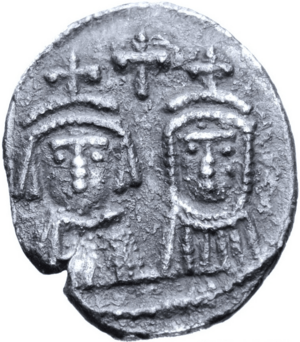Martina (empress) facts for kids
Quick facts for kids Martina |
|
|---|---|
| Augusta | |

A coin showing Heraclius's son Heraclius Constantine (left) and Martina (right)
|
|
| Empress of the Byzantine Empire | |
| Tenure | 613–641 |
| Born | 6th century |
| Died | after 641 Rhodes |
| Spouse | Heraclius |
| Issue more... |
Heraklonas |
| Dynasty | Heraclian Dynasty |
| Father | Martinus |
| Mother | Maria |
Martina (Greek: Μαρτίνα; died after 641) was an empress of the Byzantine Empire. She was the second wife of her uncle, Emperor Heraclius. In 641, she also served as a regent with her son. Martina was the daughter of Maria, who was Heraclius's sister. Her father was named Martinus.
Empress Martina's Story
Heraclius's first wife, Eudokia, passed away in August 612. Soon after, Martina married her uncle Heraclius. Some historians say this happened around 613, while others suggest it was in the 620s.
This marriage was unusual for the time. Christian rules often did not allow marriage between close family members like an uncle and his niece. Because of this, many people in Constantinople and the Church did not approve of the marriage. People also loved the first empress very much, which made Martina's marriage even less popular.
Despite the disapproval, Patriarch Sergius I of Constantinople performed the wedding ceremony. Martina was then crowned empress in the Augustaeum after Heraclius gave her the title of Augusta. Even members of the imperial family, like Heraclius's brother Theodore, spoke against the marriage.
However, the emperor and empress seemed to be very close. Martina often went with her husband on his difficult military campaigns. She was with him in Antioch when they heard about the big defeat by the Arabs at the Yarmuk River in 636. These losses made Martina even more unpopular later when she became regent.
Martina as Regent
When Emperor Heraclius was dying in 641, he decided to leave the empire to two of his sons. One was Heraclius Constantine, from his first marriage. The other was Heraklonas, his son with Martina. Both sons were given equal power. Heraclius also said that Martina should be honored as empress and mother to both of them.
Heraclius died on February 11, 641, due to an illness. Three days later, Martina announced Heraclius's will in a public ceremony. Usually, only the new emperor would do this, not the empress. Martina was trying to show her own power over the two new emperors.
The ceremony took place in the Hippodrome of Constantinople. Important people like members of the Byzantine Senate and many citizens were there. However, neither Constantine nor Heraklonas attended. Martina read the will and said she should have the most power in the Empire. But the crowd cheered for the two emperors instead of her. This showed they did not want her to have imperial authority. Martina had to go back to the palace, defeated.
Martina and her stepson, Heraclius Constantine, always had a difficult relationship. When Heraclius Constantine suddenly died just four months later from a sickness, many people believed Martina had poisoned him. They thought she wanted Heraklonas to be the only ruler. However, many historians today believe this was likely not true. Martina quickly started to send away people who supported Constantine. With help from Patriarch Pyrrhus I of Constantinople, one of her main advisors, she also brought back a certain religious policy.
Martina's Downfall
Martina's actions and the rumors about her poisoning Heraclius Constantine made the people and the Senate turn against her and her son. A general named Valentinus, with his troops, marched towards Constantinople. Heraklonas became scared and named Constans II, who was Heraclius Constantine's son, as a co-emperor.
In September 641, a large revolt began. The army took food from farms on the Asian side of the Bosphorus. That month, Martina lost the support of Patriarch Pyrrhus, who left the city after being attacked. This left her vulnerable to the Senate, who disliked her.
In November 641, Martina and her three sons—Heraklonas, David, and Marinos—were captured by the army. They were then sent away to Rhodes.
Martina's Children
Martina and Heraclius had several children. Some of them faced health challenges, which some people at the time saw as a sign of disapproval for their marriage.
Here are some of their children:
- Constantine: He died when he was young.
- Fabius: He had a paralyzed neck and also died young.
- Theodosius: He could not hear or speak.
- Heraklonas: He became emperor from 638 to 641.
- David (Tiberios): He was also briefly a co-emperor in 641. He was later sent to Rhodes.
- Marinus: He was a young son who died after being punished.
- Augustina
- Anastasia and/or Martina
- Febronia
See also
 In Spanish: Martina (emperatriz) para niños
In Spanish: Martina (emperatriz) para niños
 | James Van Der Zee |
 | Alma Thomas |
 | Ellis Wilson |
 | Margaret Taylor-Burroughs |

